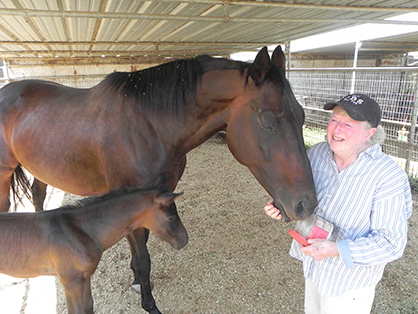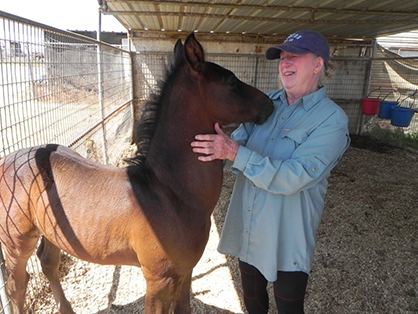First Foal Born at UC Davis Through In-Vitro Fertilization
UC Davis Veterinary Medical Teaching Hospital
At midnight on a warm summer evening in the barns at the UC Davis veterinary hospital, a first in equine medicine at UC Davis occurred. As Dr. Bruce Christensen, chief of the hospital’s Equine Reproduction Service, watched on, a mare gave birth to the first foal ever born at UC Davis by in-vitro fertilization. Through intracytoplasmic sperm injection (ICSI), an in-vitro process of impregnating a mare was successful at the renowned veterinary school. This story’s origins, however, go back almost a quarter of a century.
While raising a teenage daughter more than 20 years ago, Carol Alonso took up dressage riding with her daughter. Now 73, Alonso still rides competitively and still competes with the horse she bought 22 years ago – El Gavilan, an Andalusian. Alonso always wanted a Spanish horse, and searched far and wide to find El Gavilan, whose pedigree is 600 years long. She reluctantly had him gelded shortly after purchasing him, but had the foresight to freeze some of his semen in hopes of one day finding just the right mare to match his prowess.
At 24, El Gavilan is still going strong so Alonso felt it was finally time to find a Spanish mare to breed to him. Alonso wanted a mare that could compete in the upper levels of dressage, as El Gavilan was able to accomplish. She found that match to be a tall order. Having literally searched the world over, Alonso decided to curtail her expectations a bit, and found a non-Spanish mare in Illinois that she thought would be a good match. The mare, Zholani, was half thoroughbred and half shire.
Alonso started showing Zholani and had great success with her. She knew she had finally found the right match for El Gavilan so she met with the equine reproduction specialists at UC Davis. After a few unsuccessful attempts of artificial insemination on Zholani, Dr. Christensen suggested that Alonso enroll Zholani in his research study involving ICSI fertilization.
Unlike the normal process of in-vitro fertilization (which generally doesn’t work with horses), the ICSI process involves injecting a single sperm into an egg extracted from a mare. The embryo then develops in a lab for a week before being implanted in the mare. Few facilities in the country have the capability to perform ICSI fertilizations, so UC Davis worked in collaboration with the Equine Embryo Laboratory at Texas A&M University.
After extracting follicles from Zholani’s ovaries, six of her eggs and El Gavilan’s sperm were shipped to Texas A&M, where two viable embryos were created. Because of Zholani’s inability to previously get pregnant, the team felt it was a safer option to use a recipient mare to carry the pregnancy. A recipient mare would also allow Zholani to continue in competition. The second embryo was frozen for future use.
A mare named Kaikoura was chosen from UC Davis’ Center for Equine Health (CEH) to carry the embryo. Due to the criticalness of the early period of an equine pregnancy, Kaikoura was held at CEH for the first six weeks before she was taken to Alonso’s barn for the duration of the pregnancy. A few weeks before her due date, Kaikoura was brought back to UC Davis and put on “foal watch.”
Lord Nelson was born on Alonso’s 45th wedding anniversary, which also happened to be her husband’s birthday. Having celebrated all day, the Alonsos were exhausted when they received Dr. Christensen’s midnight phone call, stating he was witnessing the birth. They forged through, though, and drove nearly two hours to Davis in the wee hours of the morning. PICSI (pronounced Pixie), as Alonso likes to call Lord Nelson, will begin his career training for dressage as soon as he matures. His lineage has Alonso excited for his prospects. This has been a dream come true for her, having seen through a project more than two decades in the making.












